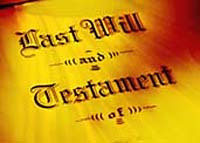 Boldface names like Aretha and Prince make the news, when they die without a will. However, for the average family, someone dying without a will is no headline. It’s an expensive and stressful mess, and sometimes, can tear families apart.
Boldface names like Aretha and Prince make the news, when they die without a will. However, for the average family, someone dying without a will is no headline. It’s an expensive and stressful mess, and sometimes, can tear families apart.
What happens when someone dies without a will is usually, for a few days, nothing. No one knows what to do. The family must find an estate planning attorney who knows nothing about the family, its assets, family relationships or what the deceased person may have wanted to happen and start the process of untangling a mess. According to the article “Don’t have a will? Lack of estate-planning could cost your successors dearly,” from The North Bay Business Journal, this is definitely not how you want to be remembered.
The most common way to avoid confusion, expense and stress is to have an estate plan, including a will, in place. Another tool used in estate planning is called a “pour-over” will. A pour-over will states that assets that have not been placed in the living trust, should go there when you die. By creating a trust that contains all of your assets, you are avoiding the cost and time it takes to go through the probate process.
A living trust is a legal document that places your assets inside a trust for your benefit, while you are still living. When you die, the assets are distributed by your chosen representative, which in this case is a successor trustee, to the beneficiaries you have named.
All states have their own laws about how trusts are treated. The court typically appoints a close relative—a spouse, adult child or grandchild, in that order—as an administrator.
That person is responsible for settling your debts, including final state and federal income taxes. Debts are deducted from the assets of the estate, then the administrator distributes the remaining assets to the deceased person’s heirs.
If you are survived by children but have no spouse, then the children inherit everything in equal shares. If you are survived by a spouse only, then assets are handled differently, depending upon whether the assets are community or separate property. Community property is property acquired during the marriage, including income earned during the marriage.
Separate property is property that a spouse owned before marriage or after a separation. It also includes property that a spouse inherits or receives as a gift before, during and after marriage. Assets can change status, if they are commingled, if the spouses have a written agreement, or the spouses improve separate property with community income.
After a decedent passes, the spouse gets all of the community property. When the decedent is survived by a spouse and there are no children, grandchildren, parents, siblings, nieces or nephews, then the spouse also inherits all the separate property.
The probate process starts with the filing of a probate petition in the county in which the decedent lives. The petitioner must also pay a court reporter fee and a fee for publishing the notice of probate with a local newspaper. The court then appoints a probate referee to appraise the estate assets. There is at least one fee for the appraisal, but there can be more fees. The probate process closes with the filing of a petition for the final distribution of the estate assets. This action also has a fee.
The probate court will also charge fees for filing other petitions, the probate notice, compensating the probate referee and if needed, for providing certified copies of court documents. When there is no will, the court requires the administrator to get a probate bond. That protects the beneficiaries and creditors, in case the administrator does not do his or her job correctly.
It sounds like a lot of trouble for a grieving family member, doesn’t it?
No one actually wants to leave this kind of a disaster for their loved ones. Take a moment to make an appointment with an experienced estate planning attorney. There are legal documents to be created that will convey your wishes for your assets and your legacy for your family and loved ones. The estate planning attorney will be able to work through any family issues, no matter how simple or complex. Feel free to contact us today.
Reference: The North Bay Business Journal (September 24, 2018) “Don’t have a will? Lack of estate-planning could cost your successors dearly”
